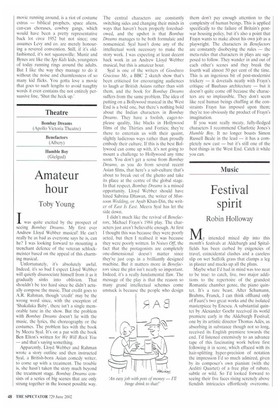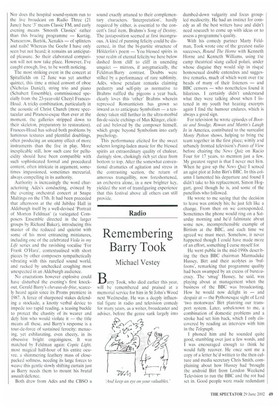Festival spirit
Robin Holloway
My intended mixed dip into this month's festivals at Aldeburgh and Spitalfields has been curbed by exigencies of travel, coincidental clashes and a careless slip on wet Suffolk grass that clamps a leg in plaster and mucks up all the plans.
Maybe what I'd had in mind was too neat to be true: to catch, live, two major additions to the repertoire of the grandest Romantic chamber genre, the piano quintet. It's a rare beast. After Schumann, Brahms, Franck, I can think offhand only of Faure's two great works and the isolated masterpiece by Enescu. A substantial quintet by Alexander Goehr received its world premiere early in the Aldeburgh Festival; one by its artistic director Thomas Ades, as absorbing in substance though not so long, received its English premiere towards the end. I'd listened extensively to an advance tape of this fascinating work before first following it in score, which effaced with its hair-splitting hyper-precision of notation the impression I'd so much admired, given by its composer's own pianism (with the Arditti Quartet) of a free play of rubato, subtle or wild. So I'd looked forward to seeing their five faces rising serenely above fiendish intricacies effortlessly overcome. Nor does the hospital sound-system run to the live broadcast on Radio Three (21 June): here '3' means Classic FM, and early evening means 'Smooth Classics' rather than this bracing programme — Kurtag, Nancarrow. Basta, Xenakis — of splinters and nails? Whereas the Goehr I have only seen but not heard; it remains an anticipated pleasure. So their elaborated comparison will not now take place. However, I've caught enough, live, to be worth noticing.
The most striking event in the concert at Spitalfields on 12 June was yet another quintet, this time a mixed consort of oboe (Nicholas Daniel), string trio and piano (Schubert Ensemble), commissioned specially from the 23-year-old Cheryl FrancesHoad. A tricky combination, particularly in the acoustic of Christ Church (more spectacular and Piranesi-esque than ever at the moment, the galleries stripped down to their skeleton, preparatory to restoration). Frances-Hoad has solved both problems by luminous textures and plentiful doublings, often producing an uncanny effect of more instruments than the five in play. More inexplicable still, how such care for pellucidity should have been compatible with such sophisticated formal and procedural content, often intricate in argument, sometimes impassioned, sometimes mercurial, always compelling in its authority.
Authority is increasingly the word characterising Ades's conducting, evinced by the evening orchestral concert at Snape Maltings on the 17th. It had been preceded that afternoon at the old Jubilee Hall in Aldeburgh itself by a well-devised 'Portrait of Morton Feldman' (a variegated Composers Ensemble directed in the larger groups by Richard Baker), introducing this master of the reduced and quietist with some of his most entrancing miniatures, including one of the celebrated Viola in my Life series and the ravishing vocalise 'For Frank O'Hara', contextualised with short pieces by other composers sympathetically vibrating with this rarefied sound world, and rucked by unchecked coughing most unexpected in an Aldeburgh audience.
No eructations however explosive could have disturbed the evening's first knockout, Gerald Barry's chevaux-de-frise, scarcely heard again since its Proms premiere in 1987. A fence of sharpened stakes defending a stockade, a knotty verbal device to impede too rapid reading, a teasing buckle to protect the chastity of its wearer and defy him who would violate it — the title means all these, and Barry's response is a tour-de-force of sustained ferocity: menacing, yet exhilarating, even cheery, in its obsessive bright ongoingness. It was matched by Feldman again: Coptic Light, most magical half-hour of his entire oeuvre, a shimmering feathery mass of closepacked softness, needing its large forces to weave this gentle slowly shifting curtain just as Barry needs them to mount his brutal assault/defence.
Both drew from Ades and the CBSO a sound exactly attuned to their complementary characters. Interpretation', hardly required by either, is essential to the concert's final item, Brahms's Song of Destiny. The juxtaposition seemed at first incongruous. A kind of punning felicity could be discerned, in that the hi-partite structure of Holderlin's poem — You blessed spirits in your realm of eternal felicity/we here below dashed from cliff to cliff in unending unquiet — mirrors, if astygmatically, the Feldman/Barry contrast. Doubts were stilled by a performance of rare sublimity. Ades, whose petulant remarks claiming pedantry and self-pity as normative to Brahms ruffled the pigeons a year back, clearly loves this 'other' Brahms wherein repressed Romanticism has grown so inward as to anticipate Symbolism — a tendency taken still further in the ultra-morbid fin-de-siecle etchings of Max Klinger, elicited and beloved by the composer himself, which grope beyond Symbolism into early psychology.
This performance elicited for the sweet solemn longing-laden music for the blessed spirits an extraordinary quality of chaleur, daringly slow, chokingly rich yet clear from bottom to top. After the somewhat conventional dramatics of agitation and stress in the contrasting section, the return of amorous tranquillity, now foreshortened, an orchestra alone, in a new brighter key, yielded the sort of transfiguring experience that this festival above all others can still provide.



































































 Previous page
Previous page